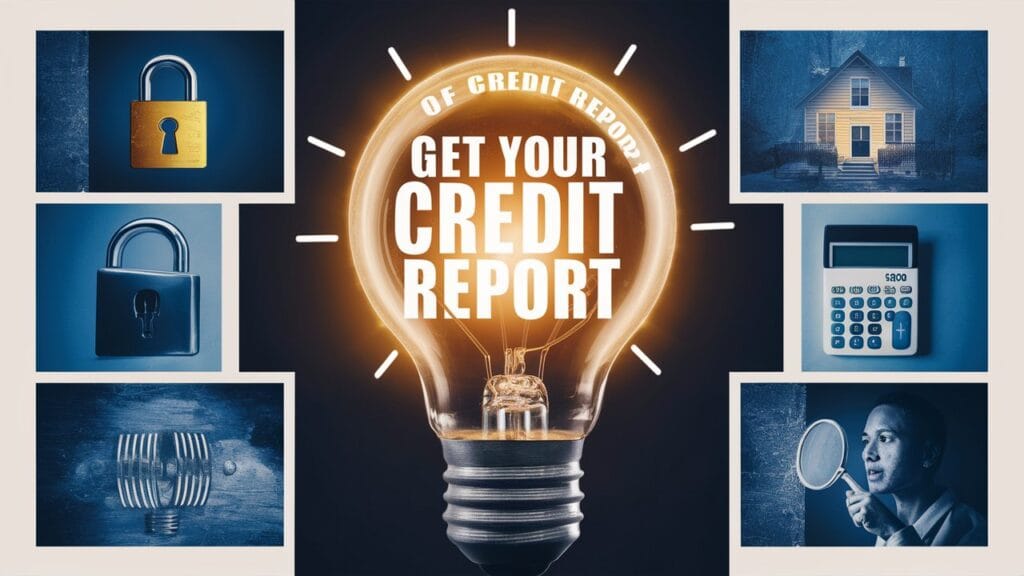What Is a Credit Report and Why Is It Important?
A credit report is a comprehensive record of your credit history, detailing how you’ve managed credit over time. It includes your borrowing and repayment patterns, outstanding debts, and any public records related to credit, such as bankruptcies or judgments. This report is crucial because it helps lenders evaluate your creditworthiness, which can affect your ability to secure loans, credit cards, or favorable interest rates. Moreover, it offers insights into your financial behavior, helping you understand areas needing improvement and ensuring you’re not a victim of identity theft.

How Regularly Checking Your Credit Report Benefits You
Regularly checking your credit report provides multiple benefits. It allows you to monitor for errors or inaccuracies that could negatively impact your credit score. By keeping track of your credit activity, you can spot and address any signs of fraudulent activity early. Furthermore, understanding your credit standing helps you manage your finances better, plan for major purchases, and improve your credit score over time.
Navigating Free Credit Report Services
The Official Source for Free Credit Reports: AnnualCreditReport.com
The U.S. government provides free credit reports annually through AnnualCreditReport.com. This website is the only authorized source for free credit reports from the three major credit bureaus: Experian, Equifax, and TransUnion. By visiting this site, you can request one report from each bureau every 12 months, ensuring a thorough review of your credit history. It’s a reliable, no-cost way to stay informed about your credit status and make sure there are no inaccuracies or fraudulent activities.
Exploring Other Free Credit Report Providers: What to Know
In addition to AnnualCreditReport.com, other services may offer free credit reports, often with additional features such as credit scores or monitoring tools. However, be cautious and verify that these providers are reputable and not scams. Many of these services operate on a freemium model, offering basic reports for free while charging for advanced features. Always review the terms and conditions and ensure that the service does not compromise your personal information.
Comparing Free Credit Report Services: Pros and Cons
When comparing free credit report services, consider the benefits and limitations of each. Official services like AnnualCreditReport.com are reliable but only offer reports annually. Other providers may offer more frequent updates or additional features but might come with conditions or upsells. Evaluate the trade-offs between comprehensiveness, convenience, and any associated costs to choose the best option for your needs.

How to Obtain Your Free Credit Report from the Major Bureaus
Requesting Your Report from Experian: A Step-by-Step Guide
To obtain your credit report from Experian, visit their website and navigate to the free credit report section. You’ll need to provide personal information such as your Social Security number, date of birth, and address. After verifying your identity, you can access your report online. Make sure to review it carefully for accuracy and download or print it for your records.
How to Get Your Credit Report from Equifax
Getting your credit report from Equifax follows a similar process. Go to the Equifax website and locate the section for requesting a free report. Enter your personal details and complete the identity verification steps. Once authenticated, you can view your report online. Equifax also allows you to download or print the report for future reference.
Accessing Your Free Credit Report from TransUnion
To access your credit report from TransUnion, visit their website and look for the option to request a free credit report. Provide the necessary personal information to verify your identity. After successful verification, you’ll be able to view your credit report. As with other bureaus, ensure you save or print your report for thorough examination and record-keeping.
TAKING in the Different Types of Credit Reports
Detailed Credit Reports vs. Basic Reports: What’s the Difference?
Credit reports can vary in detail. Detailed reports provide a comprehensive view of your credit history, including all credit accounts, payment history, and public records. Basic reports may only offer a summary of your credit status or highlight major accounts. Understanding these differences helps you choose the report that best meets your needs for monitoring and improving your credit.
What Information Is Included in Your Credit Report?
Your credit report includes several key sections: personal information, credit accounts, credit inquiries, and public records. Personal information includes your name, address, and Social Security number. Credit accounts detail your credit cards, loans, and payment history. Credit inquiries show who has accessed your report, and public records might include bankruptcies or judgments. Reviewing each section helps you understand your credit standing and identify areas for improvement.
The Timing of Your Free Credit Report
How Often Can You Request a Free Credit Report?
You are entitled to one free credit report from each of the three major credit bureaus—Experian, Equifax, and TransUnion—every 12 months through AnnualCreditReport.com. However, you can request additional reports from other providers or through special circumstances such as being denied credit or if you suspect identity theft. Regular monitoring helps maintain an accurate and up-to-date view of your credit.
When to Request Your Report for Optimal Financial Monitoring
To optimize financial monitoring, consider staggering your requests for free credit reports from each bureau. For example, request one report every four months to keep a continuous check on your credit status. This approach helps you catch and address any issues early, rather than waiting for the annual review.

How to Access Your Free Credit Report Online
The Online Request Process: Easy Steps to Follow
Accessing your free credit report online is straightforward. Visit the official website, such as AnnualCreditReport.com, and follow the instructions to request your report. You’ll need to provide personal details for verification. After successfully verifying your identity, you can view, download, or print your report. Ensure that you are on a secure network to protect your personal information.
Securing Your Personal Information When Requesting Online
When requesting your credit report online, security is paramount. Make sure you are on a secure website (look for “https” in the URL) and use a trusted, updated browser. Avoid using public Wi-Fi for this process to prevent potential data breaches. Regularly updating your passwords and using two-factor authentication where possible further safeguards your personal information.
TAKING in Your Credit Report: Key Sections to Review
Personal Information: Accuracy and Updates
Review the personal information section of your credit report to ensure all details are correct. This includes your name, address, Social Security number, and employment information. Any inaccuracies here could affect your creditworthiness and might indicate potential identity theft. Update any incorrect information promptly to avoid complications.
Credit Accounts: What to Look For
Examine the credit accounts section for details on all your active and closed accounts. Check for accuracy in account balances, payment history, and account statuses. Look for any accounts you do not recognize, which might suggest fraudulent activity. Ensuring this section is accurate helps maintain a good credit score and prevents issues with credit applications.
Credit Inquiries: What They Mean for Your Score
Credit inquiries show who has accessed your credit report. There are two types: hard inquiries, which occur when you apply for credit, and soft inquiries, which do not impact your credit score. Understanding the difference helps you assess how your credit behavior affects your score and manage it effectively.
Public Records: Checking for Accuracy
Public records on your credit report include information such as bankruptcies, judgments, and liens. Verify that this information is accurate and reflects your financial history. Any inaccuracies in public records can significantly impact your credit score and require prompt correction.
Disputing Errors on Your Credit Report
How to Identify Errors and Inaccuracies
Identify errors by reviewing each section of your credit report for discrepancies. Common errors include incorrect account details, outdated information, or accounts that don’t belong to you. Regular checks can help you catch and address these issues early, ensuring a more accurate credit profile.
The Dispute Process: How to Correct Mistakes
To dispute errors, contact the credit bureau that issued the report and file a dispute. Provide evidence supporting your claim, such as documents or correspondence. The bureau will investigate and correct any verified inaccuracies, typically within 30 days. Follow up to ensure the errors are corrected and your report reflects accurate information.
What to Do If Your Dispute Is Denied
If your dispute is denied, review the bureau’s findings and provide additional documentation if necessary. You may also request a statement of dispute to be added to your report, explaining your side of the issue. Consider contacting the creditor directly for resolution or seeking advice from a credit counselor if needed.
How to Use Your Free Credit Report to Improve Your Credit Score
Identifying Negative Entries and Addressing Them
Use your credit report to identify any negative entries such as late payments or high credit utilization. Address these issues by paying down debt, negotiating with creditors, or setting up a payment plan. Improving these areas can positively impact your credit score over time.
Monitoring Changes and Trends in Your Credit Report
Regularly monitor your credit report to track changes and identify trends. Look for improvements in your credit score or any emerging issues. Understanding these trends helps you make informed financial decisions and manage your credit effectively.
Setting Financial Goals Based on Your Credit Report
Set specific financial goals based on your credit report, such as reducing debt, improving payment history, or increasing your credit score. Use your report to track progress towards these goals and adjust your financial strategies as needed to achieve them.
Common Pitfalls to Avoid When Requesting a Free Credit Report
Avoiding Scams and Fraudulent Services
Be cautious of scams or fraudulent services that claim to offer free credit reports. Always use authorized, reputable sources such as AnnualCreditReport.com. Avoid services that require payment or ask for sensitive personal information beyond what is necessary for verification.
Understanding Terms and Conditions of Free Report Offers
Before using any free credit report service, thoroughly read the terms and conditions. Ensure
you understand any limitations or conditions, such as automatic enrollment in paid services or marketing offers. Knowing these details helps you avoid unexpected costs or issues.
The Impact of Checking Your Credit Report on Your Credit Score
Will Requesting a Free Credit Report Affect Your Score?
Requesting a free credit report does not affect your credit score. This type of inquiry is considered a soft inquiry, which does not impact your credit rating. Regularly reviewing your report is a proactive step in managing your credit without any negative repercussions.
How to Differentiate Between Soft and Hard Inquiries
Soft inquiries occur when you check your own credit report or when a company checks your credit for pre-approval offers. Hard inquiries happen when you apply for credit and a lender reviews your report as part of their decision-making process. Understanding these types of inquiries helps you manage your credit score and application strategies effectively.
Additional Resources for Credit Monitoring
Credit Monitoring Services: Are They Worth It?
Credit monitoring services can offer additional features like alerts for changes to your credit report and access to your credit score. Evaluate these services based on your needs and budget. While they can provide added security, ensure that you choose reputable services and understand the costs involved.
Using Financial Apps for Ongoing Credit Management
Financial apps can assist in ongoing credit management by offering tools for tracking your credit score, managing debt, and setting financial goals. Explore apps with features that align with your financial needs and ensure they are secure and reputable.
Maintaining Your Credit Health Year-Round
Regular Review vs. Annual Check-Up: Which Is Better?
Regularly reviewing your credit report, such as quarterly or semi-annually, provides more frequent insights into your credit status and helps you address issues promptly. An annual check-up is still valuable, but more frequent reviews can offer better financial management and protection against potential problems.
Setting Up Alerts and Reminders for Credit Monitoring
Set up alerts and reminders to stay on top of your credit monitoring. Many credit bureaus and financial apps offer notifications for changes in your credit report or upcoming payment due dates. Using these tools helps you stay informed and proactive in managing your credit health.
BOTTOM LINE
Recap of Key Steps to Obtain and Review Your Free Report
To maximize the benefits of your free credit report, request it annually from the official sources, review all sections for accuracy, and address any issues promptly. Regular monitoring helps you maintain a healthy credit profile and avoid potential problems.
Encouragement to Stay Proactive in Managing Your Credit
Staying proactive in managing your credit involves regular reviews, understanding your credit report, and taking action to improve your credit score. By being diligent and informed, you can ensure a strong credit history and achieve your financial goals.
Frequently Asked Questions (FAQs)
What information do I need to provide to get a credit report?
To obtain your credit report, you’ll need to provide personal information for identity verification. This typically includes your full name, Social Security number, date of birth, and current address. You may also need to provide details about any previous addresses or employment information, depending on the credit bureau’s requirements.
How often should I check my credit report?
It’s advisable to check your credit report at least once a year to ensure its accuracy and to monitor for any signs of identity theft. Staggering your requests from different bureaus throughout the year can help you keep an eye on your credit status more frequently.
Where can I obtain my credit report online?
You can obtain your credit report online through AnnualCreditReport.com, the official website authorized by federal law for free credit reports from the three major credit bureaus: Experian, Equifax, and TransUnion.
What is the difference between a credit report and a credit score?
A credit report is a detailed record of your credit history, including information on credit accounts, payment history, and public records. A credit score, on the other hand, is a numerical representation of your creditworthiness derived from the information in your credit report. While the report provides detailed data, the score offers a summary rating of your credit health.
Can I get a credit report without a credit card?
Yes, you can obtain a credit report without having a credit card. Credit reports are accessible to anyone, regardless of their credit card ownership. You just need to provide the necessary personal information for identity verification.
How do I dispute errors on my credit report?
To dispute errors on your credit report, contact the credit bureau that issued the report and submit a dispute. Provide documentation supporting your claim and describe the error clearly. The bureau will investigate and resolve the issue, typically within 30 days.
Are there any services that offer free credit reports?
Yes, there are services that offer free credit reports. The most reliable source is AnnualCreditReport.com, which provides free reports from the three major bureaus annually. Some other financial services or credit monitoring tools may also offer free reports or score tracking, but be cautious of potential upsells.
How do I request my credit report from the major credit bureaus?
You can request your credit report from the major credit bureaus—Experian, Equifax, and TransUnion—through their respective websites or by mail. Each bureau requires you to provide personal information for identity verification.
What are the steps to access my credit report from Experian, Equifax, and TransUnion?
To access your credit report from Experian, Equifax, or TransUnion, visit their websites and navigate to the section for requesting a free report. Provide the required personal details and follow the instructions for verification. Once verified, you can view or download your report.
How long does it take to receive my credit report?
If you request your credit report online, you typically receive it immediately upon successful verification. If you request it by mail, it may take a few weeks to receive the report, depending on the processing times of the credit bureau.
What should I do if my credit report is inaccurate?
If your credit report contains inaccuracies, file a dispute with the credit bureau that issued the report. Provide evidence supporting your claim and follow up to ensure the corrections are made. If the dispute is denied, you may need to provide additional documentation or seek assistance from a credit counselor.
Can I get a credit report if I am not in the U.S.?
Obtaining a U.S. credit report from abroad can be challenging. You can request your report online if you have a U.S. address and Social Security number. If you are living abroad, consider contacting the credit bureaus directly for guidance on how to access your report.
How do I check my credit report for identity theft?
To check for identity theft, review your credit report for any accounts or inquiries you do not recognize. Look for signs of unusual activity, such as new accounts opened in your name or addresses that are not yours. Promptly report any suspicious activity to the credit bureau and consider placing a fraud alert on your report.
Will requesting my credit report affect my credit score?
Requesting your credit report does not affect your credit score, as it is considered a soft inquiry. Unlike hard inquiries, which occur when applying for new credit and can impact your score, checking your own report has no impact on your credit rating.









